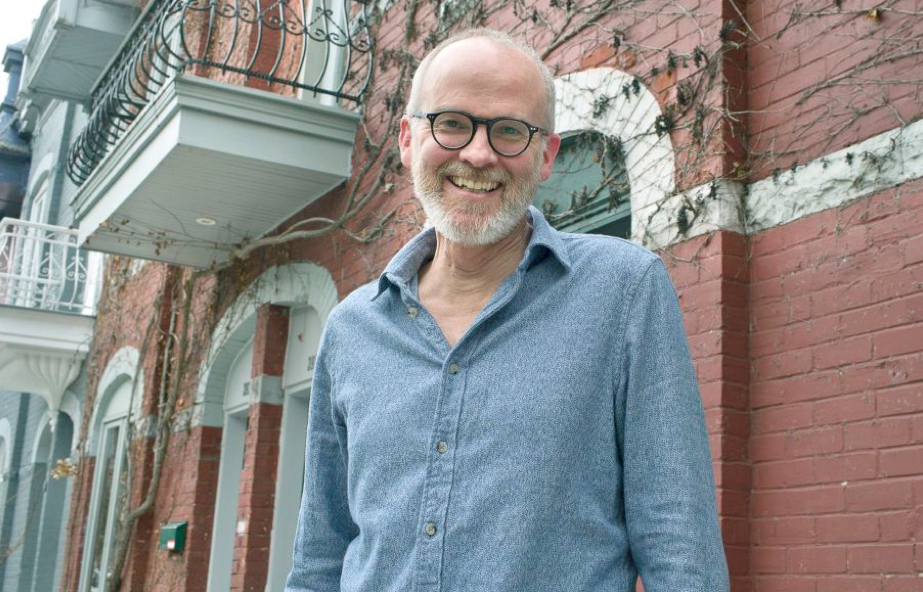Jeff Heinrich in cross-fade
By Stéphane Baillargeon
Jeff Heinrich starts off by talking about Ross Teague, one of his former bosses at The Gazette. In the fall of 2014, the senior manager had finished helping launch an important new digital platform at the Montreal daily newspaper. His workday over, Teague sent one last tweet (“My weekend project? Reimagine sleep!”) and took the bus home. He was dead before he got there, brought down by a massive heart attack. He was 56 years old.
“He was a good guy, one of those managers everyone liked,” Heinrich said. “Was his death symptomatic of everything that was happening with the company? Was something else stressing him out? I don’t know. But it really gave me a shock.”
Several months before, Heinrich himself had left the paper, Quebec’s oldest, founded in the 18th century. He was 52 when he worked his last shift there.
“Every time February would roll around, there were buyouts,” he recalled. “And each time, I’d ask myself whether I should leave. When I finally did, in February 2014, I got some statistics from the union. The Gazette had about 1,000 employees in 1999. When I left, there were only 250. Half of those were gone in the previous five years.”
The brain-drain didn’t just hit the newsroom, but was felt throughout the company. Heinrich had joined The Gazette a quarter-century earlier, in 1989.
“In my first three months, I covered the massacre at the École Polytechnique and (went to Germany for) the fall of the Berlin Wall. There was a generational change happening. We young reporters had university degrees and were bilingual. We never thought that the journalism we’d started to practice would someday disappear.”
Disappear? Yes, in the sense that loads of jobs are now evaporating and that the profession is undergoing radical change.
Heinrich is and remains an excellent journalist. He shined brilliantly in his coverage of the hearings of the Bouchard-Taylor commission into reasonable accomodation of religious minorities, in 2007. That led to a book, Circus Quebecus (published by Les Éditions du Boréal), which he co-wrote with Le Journal de Montréal reporter Valérie Dufour. She herself wound up leaving her job there, after the long lockout of 2009-2011.
Eventually, however, Heinrich came to realize that his bosses wanted him to become the kind of general reporter he’d been when he was younger, working faster and faster. What he really wanted to do was specialize in cinema, his longtime artistic passion.
“I had a weekly DVD column for several years and (in 2009) moved to the arts section. I thought I’d work there until I retired but as more and more staff got cut I eventually got transferred to the business section and then to the general news section. I worked nights and weekends, just like everyone else, without a problem. But it wasn’t what I wanted to do anymore. My final evening shift, I did cop checks (monitoring police communications). It was like I was back where I started, working nights at the Ottawa Citizen. I’d come full circle.”
He now operates out of his house, in a lovely “cottage” in the Plateau Mont-Royal. The buyout gave him a year-and-a-half’s salary. He freelanced for The Guardian in London and did translations. He continues to blog on Montreal’s cultural life (jeffheinrich.com). Since December, he’s been enrolled in a Quebec government training program for budding entrepreneurs and is now preparing the launch of Projection 21, “a new communications agency for Quebec cinema,” as his business card says.
“It’s a small company that promotes films that are made here,” he explained. “I write press kits, communiqués and all kinds of promotional material in both languages, and help clients get in touch with journalists. I’ve just finished drafting my business plan, about 50 pages. The market is served by a few agencies already; I just want a piece of what independent film companies are spending.”
In short, like a lot of journalists, he’s “going over to the dark side,” as they say in a certain non-independent film (Star Wars). That’s where the jobs often are now, in communications. In 2014, when his boss died and Heinrich left The Gazette, the ratio of PR people to journalists in Quebec was six to one.
“I won’t earn what I was earning at The Gazette,” concluded the founder of Projection 21. “I don’t need a large salary. I think people appreciate the expertise that journalists have. We’re used to working fast and working well.”
This story was originally published in Le Devoir and is republished here with the author’s permission.

